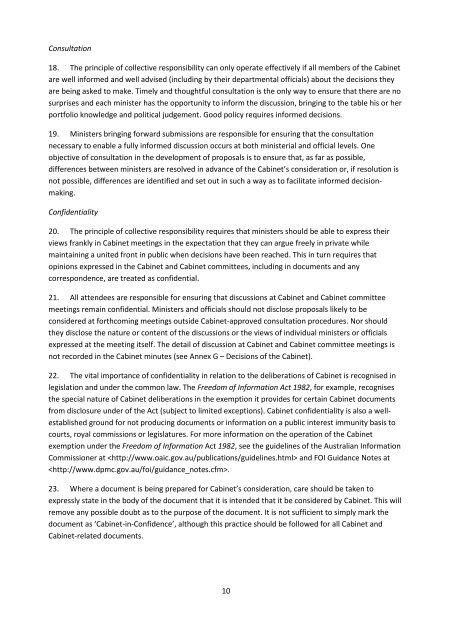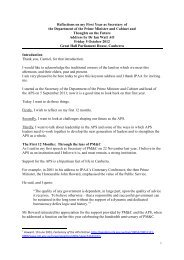Cabinet Handbook - The Department of the Prime Minister and ...
Cabinet Handbook - The Department of the Prime Minister and ...
Cabinet Handbook - The Department of the Prime Minister and ...
You also want an ePaper? Increase the reach of your titles
YUMPU automatically turns print PDFs into web optimized ePapers that Google loves.
Consultation<br />
18. <strong>The</strong> principle <strong>of</strong> collective responsibility can only operate effectively if all members <strong>of</strong> <strong>the</strong> <strong>Cabinet</strong><br />
are well informed <strong>and</strong> well advised (including by <strong>the</strong>ir departmental <strong>of</strong>ficials) about <strong>the</strong> decisions <strong>the</strong>y<br />
are being asked to make. Timely <strong>and</strong> thoughtful consultation is <strong>the</strong> only way to ensure that <strong>the</strong>re are no<br />
surprises <strong>and</strong> each minister has <strong>the</strong> opportunity to inform <strong>the</strong> discussion, bringing to <strong>the</strong> table his or her<br />
portfolio knowledge <strong>and</strong> political judgement. Good policy requires informed decisions.<br />
19. <strong>Minister</strong>s bringing forward submissions are responsible for ensuring that <strong>the</strong> consultation<br />
necessary to enable a fully informed discussion occurs at both ministerial <strong>and</strong> <strong>of</strong>ficial levels. One<br />
objective <strong>of</strong> consultation in <strong>the</strong> development <strong>of</strong> proposals is to ensure that, as far as possible,<br />
differences between ministers are resolved in advance <strong>of</strong> <strong>the</strong> <strong>Cabinet</strong>’s consideration or, if resolution is<br />
not possible, differences are identified <strong>and</strong> set out in such a way as to facilitate informed decisionmaking.<br />
Confidentiality<br />
20. <strong>The</strong> principle <strong>of</strong> collective responsibility requires that ministers should be able to express <strong>the</strong>ir<br />
views frankly in <strong>Cabinet</strong> meetings in <strong>the</strong> expectation that <strong>the</strong>y can argue freely in private while<br />
maintaining a united front in public when decisions have been reached. This in turn requires that<br />
opinions expressed in <strong>the</strong> <strong>Cabinet</strong> <strong>and</strong> <strong>Cabinet</strong> committees, including in documents <strong>and</strong> any<br />
correspondence, are treated as confidential.<br />
21. All attendees are responsible for ensuring that discussions at <strong>Cabinet</strong> <strong>and</strong> <strong>Cabinet</strong> committee<br />
meetings remain confidential. <strong>Minister</strong>s <strong>and</strong> <strong>of</strong>ficials should not disclose proposals likely to be<br />
considered at forthcoming meetings outside <strong>Cabinet</strong>-approved consultation procedures. Nor should<br />
<strong>the</strong>y disclose <strong>the</strong> nature or content <strong>of</strong> <strong>the</strong> discussions or <strong>the</strong> views <strong>of</strong> individual ministers or <strong>of</strong>ficials<br />
expressed at <strong>the</strong> meeting itself. <strong>The</strong> detail <strong>of</strong> discussion at <strong>Cabinet</strong> <strong>and</strong> <strong>Cabinet</strong> committee meetings is<br />
not recorded in <strong>the</strong> <strong>Cabinet</strong> minutes (see Annex G – Decisions <strong>of</strong> <strong>the</strong> <strong>Cabinet</strong>).<br />
22. <strong>The</strong> vital importance <strong>of</strong> confidentiality in relation to <strong>the</strong> deliberations <strong>of</strong> <strong>Cabinet</strong> is recognised in<br />
legislation <strong>and</strong> under <strong>the</strong> common law. <strong>The</strong> Freedom <strong>of</strong> Information Act 1982, for example, recognises<br />
<strong>the</strong> special nature <strong>of</strong> <strong>Cabinet</strong> deliberations in <strong>the</strong> exemption it provides for certain <strong>Cabinet</strong> documents<br />
from disclosure under <strong>of</strong> <strong>the</strong> Act (subject to limited exceptions). <strong>Cabinet</strong> confidentiality is also a wellestablished<br />
ground for not producing documents or information on a public interest immunity basis to<br />
courts, royal commissions or legislatures. For more information on <strong>the</strong> operation <strong>of</strong> <strong>the</strong> <strong>Cabinet</strong><br />
exemption under <strong>the</strong> Freedom <strong>of</strong> Information Act 1982, see <strong>the</strong> guidelines <strong>of</strong> <strong>the</strong> Australian Information<br />
Commissioner at <strong>and</strong> FOI Guidance Notes at<br />
.<br />
23. Where a document is being prepared for <strong>Cabinet</strong>’s consideration, care should be taken to<br />
expressly state in <strong>the</strong> body <strong>of</strong> <strong>the</strong> document that it is intended that it be considered by <strong>Cabinet</strong>. This will<br />
remove any possible doubt as to <strong>the</strong> purpose <strong>of</strong> <strong>the</strong> document. It is not sufficient to simply mark <strong>the</strong><br />
document as ‘<strong>Cabinet</strong>-in-Confidence’, although this practice should be followed for all <strong>Cabinet</strong> <strong>and</strong><br />
<strong>Cabinet</strong>-related documents.<br />
10




